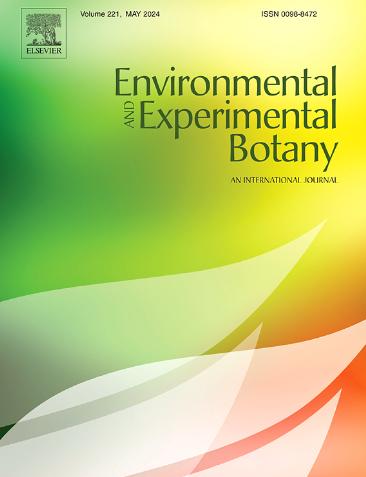外源施用MT通过增加脂肪酸去饱和和多胺代谢来增强茶树的耐寒性
IF 4.7
2区 生物学
Q2 ENVIRONMENTAL SCIENCES
引用次数: 0
摘要
褪黑素是一种重要的生物活性小分子,在植物对温度或水分胁迫的反应中起着至关重要的作用。然而,MT对生理反应的调节作用的内在机制尚不清楚。本研究研究了外源MT对冷胁迫下茶树脂肪酸和多胺代谢的调控机制。100 μM MT处理显著提高了茶树的耐寒性。此外,PCPA (MT代谢抑制剂)进一步加重了冷诱导的细胞损伤。与表型变化一致的是,与冷胁迫相比,叶面施用MT显著提高了脂肪酸不饱和度和PA水平。相比之下,MT代谢抑制剂PCPA在PCPA + 冷处理下进一步降低了脂肪酸去饱和和多胺水平。为了进一步阐明MT在调节脂肪酸和PA代谢中的作用,我们通过病毒诱导基因沉默(VIGS)产生了MT合成关键酶CsCOMT3沉默的茶叶。与对照叶相比,cscomt3抑制的茶叶蔫变明显,叶绿素荧光减弱,脂肪酸不饱和和PAs水平降低。我们的研究结果清楚地表明,MT可能是一种通过促进脂肪酸和PA代谢来减轻茶树冷损伤的可行策略。本文章由计算机程序翻译,如有差异,请以英文原文为准。
Exogenously applied MT enhanced cold tolerance in tea plants by increasing fatty acid desaturation and polyamine metabolism
MT (melatonin), an important bioactive small molecule, plays crucial roles in plant responses to temperature or water stress. However, the intrinsic mechanisms underlying the modulatory effects of MT on physiological reactions are less clear. In this study, the mechanism by which exogenous MT modulates fatty acid and polyamine (PA) metabolism in tea plants under cold stress was studied. Application of 100 μM MT significantly increased the cold tolerance of tea plants. Additionally, PCPA (MT metabolic inhibitor) further aggravated cold-induced cell damage. Consistent with the change in phenotype, foliar application of MT significantly increased fatty acid unsaturation and PA levels compared with those under cold stress. In contrast, the MT metabolic inhibitor PCPA further impaired fatty acid desaturation and polyamine levels under the PCPA + cold treatment compared with those under the cold treatment. To further elucidate the role of MT in regulating fatty acid and PA metabolism, CsCOMT3 (a key enzyme in MT synthesis)-silenced tea leaves were generated via virus-induced gene silencing (VIGS). Compared with the control leaves, CsCOMT3-inhibited tea leaves presented greater wilting and weaker chlorophyll fluorescence, with lower levels of fatty acid unsaturation and PAs. Our results clearly revealed that MT application may be a feasible strategy to relieve cold injury in tea plants by enhancing fatty acid and PA metabolism.
求助全文
通过发布文献求助,成功后即可免费获取论文全文。
去求助
来源期刊

Environmental and Experimental Botany
环境科学-环境科学
CiteScore
9.30
自引率
5.30%
发文量
342
审稿时长
26 days
期刊介绍:
Environmental and Experimental Botany (EEB) publishes research papers on the physical, chemical, biological, molecular mechanisms and processes involved in the responses of plants to their environment.
In addition to research papers, the journal includes review articles. Submission is in agreement with the Editors-in-Chief.
The Journal also publishes special issues which are built by invited guest editors and are related to the main themes of EEB.
The areas covered by the Journal include:
(1) Responses of plants to heavy metals and pollutants
(2) Plant/water interactions (salinity, drought, flooding)
(3) Responses of plants to radiations ranging from UV-B to infrared
(4) Plant/atmosphere relations (ozone, CO2 , temperature)
(5) Global change impacts on plant ecophysiology
(6) Biotic interactions involving environmental factors.
 求助内容:
求助内容: 应助结果提醒方式:
应助结果提醒方式:


